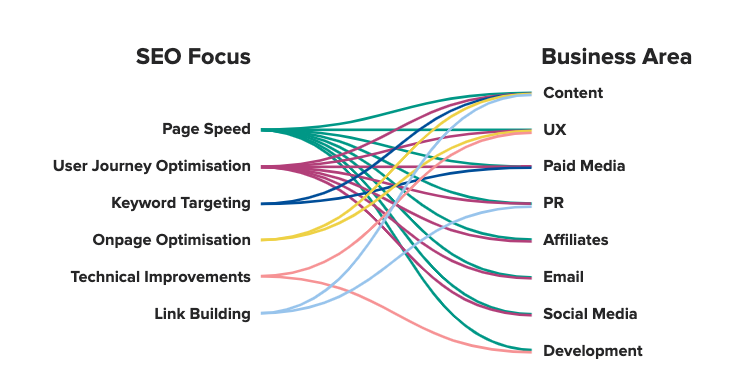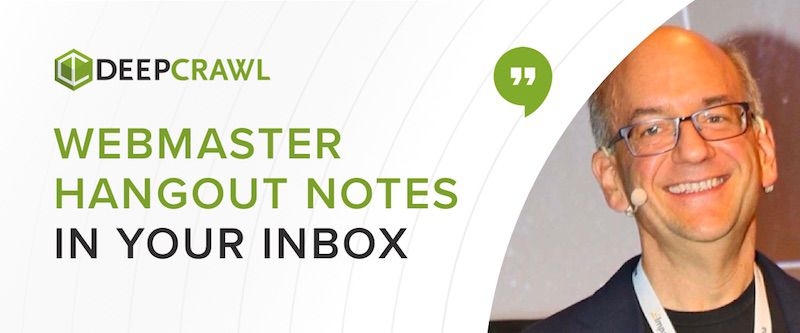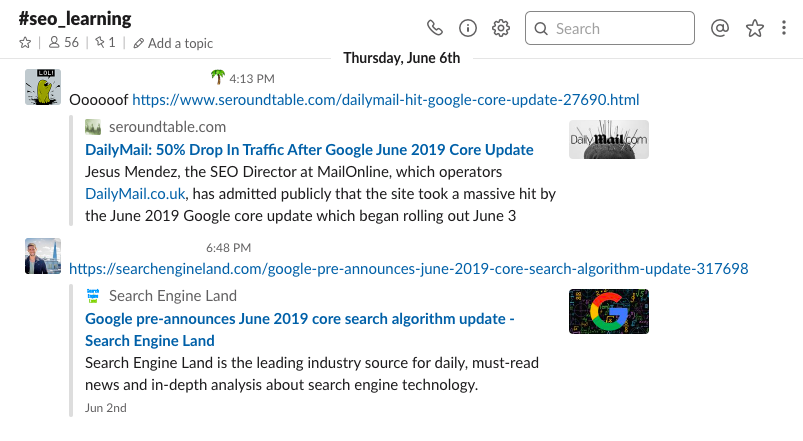Chapter 1: The Biggest Challenges in Enterprise SEO
The most important place to start to be able to succeed in enterprise environments is to build a culture of SEO. This involves educating stakeholders and your colleagues about the importance of SEO.
To be successful in enterprise SEO, you have to bring stakeholders and internal teams on board and get them to care about SEO by building a culture around it.
Bringing everyone working on a project together under the common goal of ensuring strong website performance from the start, can really pay off in the long run. This way you won’t have to force people to consider SEO implications at the end of the project as an afterthought; they’ll be keeping them in mind throughout the project as it progresses. The way to make this happen is to get people to care about SEO.
Luckily, there is a common theme of SEO that everyone in the company can get behind. Today, SEO could stand for Search Experience Optimisation, because we optimize for the user, not the search engine. Google’s ranking algorithms have been gradually shifting more to favor UX. It’s all about searcher happiness and serving searcher intent as this is what’s impacting algorithms most.
The website is the core anchor of many marketing strategies, so when the SEO team implements fixes aimed at increasing the site’s performance in organic search and user happiness and conversions, the business as a whole benefits.

Source: Rachel Costello
For enterprise companies, SEO can’t succeed within a silo, it needs to have visibility within the rest of the company.
Over the past decade plus I have been welcomed into the world’s largest enterprise organizations to help them improve SEO. One of the lessons that I’ve learned is that the siloed mentality of treating SEO as a tactic when its success is so dependent on the organization and cultural acceptance of multiple disciplines (such as IT, content, marketing, product and others) is a sure-fire recipe for failure. Treat SEO as a culture, not a tactic.

To get others to care about and buy in to SEO, they need to:
- Understand what it is
- Understand why it’s important
- Trust you as an authority
- Want to work with you
Growing your authority internally as an SEO
To begin the process of building a culture of SEO, you first need to build credibility and respect within your company by proving yourself to be the go-to resource for anything SEO related. This means keeping your finger on the pulse of the SEO industry and keeping up to date with the latest news and developments, and then sharing them internally.
For people to pay attention to what you’re saying about SEO, you need to prove to them that you know what you’re talking about.
For your company to take your recommendations on board, they have to be able to trust your position as an authority on SEO.
As much as we would probably all enjoy having the time to browse through a variety of different publications to find impactful news within the search landscape, this isn’t always possible due to packed schedules and workloads.
However, rather than doing all of the research and collation yourself, make use of other sources out there that curate this information for you by setting up automatic alerts for new posts on your favourite publications, or subscribing to newsletters such as the Moz Top 10, Tech Bound, The Weekly SEO or Lumar’s coverage of the Google Webmaster Hangouts.

Sign up to our newsletter to receive the latest news from Google
How you then raise awareness and share this information internally is up to you, as it depends on what best suits your company and its teams. For example, you could create a company-wide SEO newsletter collating the key developments in the industry each month, or you could even set up a Slack channel where you can share articles with one another.

Educating your company about SEO
Take the time to bring people on board by educating them about the importance of SEO and how it can be valuable for the business to follow best practices. Stakeholders won’t buy in to a project if they don’t understand it, care about it or believe in its value, so avoid using technical jargon and instead use language that will resonate with them.
Impactful SEO isn’t executed by a lone wolf. You need buy-in for resources. Problem is, decision makers often see SEO as a mystical box with unknown value inside. Stop writing detailed, multi-page SEO strategy documents. Executives won’t read them. Break complex, overarching projects down into small, incremental changes.
For example, if you need to improve on-page SEO site-wide. Start with something super simple, but that will show a result. Say, changing the homepage title tag. When your quick wins produce a positive impact on KPIs, call them out (being sure to thank any developer who helped implement them) and in the same email/meeting/presentation, give the clear next step of another snackable SEO task.
This approach makes SEO tasks easy to slot in around other business priorities and builds trust you can leverage for larger projects.

Rather than jumping into the technical details of canonicalization configurations, explain the concept of page authority and how this can sometimes be diluted when you have too many pages trying to fulfill the same purpose, and that one stronger page has a better chance of ranking and bringing in revenue.
Become a steward of SEO for the wider company and teach them what SEO is, and more importantly, how it can impact both the website and the bottom line.
No matter the flawlessness of your planned SEO strategies, these will struggle to properly get off the ground if you have limited resources and no prioritisation. This becomes a difficult task, especially in a larger company where demands are high and the SEO team might be perceived as a basement dwelling team of keyword stuffers.
Not only do you need to defend your cases, provide ROI evaluations, and generally prove why you deserve new features developed, you need to preach the “good word of SEO” (i.e. how your work drives crucial website traffic and conversions, and helps the whole product grow). At SIXT, we’ve worked hard on our internal awareness and better communication over the years and it’s made serious improvements to the acceleration of SEO projects. We’ve achieved this by a number of means involving varied internal learning sessions where we hear about other department’s work, and can in turn educate and motivate others regarding the impactful and diverse projects the SEO team create.

During your education process, you need to make sure that internal teams know:
- How SEO can impact them.
- How they can impact SEO.
A developer should be made aware of the fact that noindex tags can prevent users from finding the website they’ve worked so hard to build. No one wants to build something that nobody will end up using!
When you’re managing an enterprise website, there are plenty of moving pieces. Because SEO is a channel that is affected by many other departments, it’s important to have SEO team collaborating with cross-functional stakeholders:
- Development & Operations – Whenever a new feature is being developed, it’s important to make sure the SEO team is providing business requirements and acceptance criteria. Once the feature is built, the SEO team needs to perform User Acceptance Testing (UAT) using a Googlebot simulation, like Lumar, to ensure the feature is operating as planned.
- Content / Creative Production – When new digital assets are created for the website, it’s important that they’re responsive and well-optimized for the web. SEO team oftentimes provides topic research, editorial review, and tagging standards to ensure the new digital asset can perform the best that it can be.
- Social Media – The social media team also can indirectly lead to blogging opportunities with publishers. The SEO team assists with Outreach by making sure our website is featured through high-quality links from influencers that are from our target audience.
- Retail / 3rd Party Ecommerce – How and where we sell our products online and offline creates an ecosystem for our products and services. As a brand, it’s important to ensure we’re selling in the right place for our customers.

Getting SEO wrong can also lead to huge negative impacts for a website. Think about sweeping algorithm updates which can immediately wipe out a site’s hard-earned organic traffic. There is a lot at stake and this needs to be communicated effectively so that decision-makers won’t be able to shrug off SEO as a ‘nice to have’ bonus, but as a fundamental ‘must-have’ part of the business strategy.
You’ll know that you’re doing a good job once people start coming to you with questions about the impact of SEO performance before they undertake a project. For example, if a merchandiser asks you about best practices for handling out-of-stock pages before they start removing products at will, that means that they understand the consequences of broken pages which is great.
If the rest of the company is educated about the potential risks and rewards of SEO, they can help you in spotting issues and raising concerns around the different projects across the business. This will lighten the burden on the SEO as they won’t have the pressure to be all-knowing and go out of their way to keep up-to-date with every single potential issue for every project in every department that will impact the website; these issues will be brought to you.
Establishing relationships
In enterprise SEO, having the skills to build relationships and persuade people can be far more powerful than having technical knowledge alone. To be able to get SEO fixes prioritized and implemented, you need to have a strong internal network that is built on communication, empathy and trust.
You can be a technically skilled SEO, but without internal relationships within your company you may struggle to be able to get anything implemented.
Your internal network is key to get stuff done. Going beyond the prioritization and getting your product teams go the extra mile really is helped by close, personal relationships. A beer and pizza budget is one way to get there, but real relationships are built through personal interest. As an in-house enterprise SEO, you need to have a lot of empathy to be able to build such relationships.
Also, your external network can help you in getting information on any algorithmic changes your peers see in their data. Having a large rolodex of people you can trust is a big advantage for any enterprise SEO.

Getting others on your side will be much easier if you commit to SEO education and helping them understand why you need whatever it is you’re asking for, and then sharing how they in turn helped your project to achieve success.
As an in-house SEO you won’t get far without buy-in from the cross-functional teams that you depend on for implementation of your recommendations, such as the engineering, design, site merchandising and editorial teams. It’s important to walk them through the “why” as you communicate. When they come on board and execute for you and as a result you drive success, be sure to celebrate their contribution. This will pay off the next time you have an ask.

Stronger internal relationships allow for more cross-collaboration between teams, which increases the chance of success in enterprise SEO. An enterprise SEO has to be good at integrating with other channels and working with other teams.
Chapter 3: Analyzing & Managing Enterprise Websites

